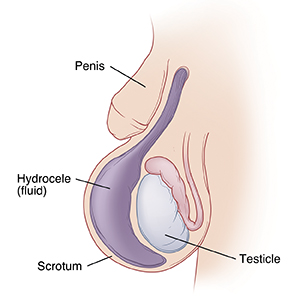A
B
C
D
E
F
G
H
I
J
K
L
M
N
O
P
Q
R
S
T
U
V
W
X
Y
Z
Click a letter to see a list of conditions beginning with that letter.
Click 'Topic Index' to return to the index for the current topic.
Click 'Library Index' to return to the listing of all topics.
Hydrocele in the Newborn
Hydrocele is a problem that sometimes happens to baby boys. It occurs when belly (abdominal) fluid builds up in the groin or in the scrotum near the testicles. This could happen because the baby’s abdominal wall wasn’t fully developed at birth. Or there may be an opening between the abdomen and scrotum that didn’t close as it should have after birth.

When is a hydrocele treated?
Hydrocele often goes away by itself, as the body slowly absorbs the abdominal fluid. But in some cases, surgery is needed. The hydrocele will be treated if:
-
The amount of fluid increases, making the scrotum large and firm.
-
The fluid isn’t absorbed within the baby’s first 6 months of life.
-
The baby also has a loop of bowel (a hernia) extending into the same area.
What are the long-term effects?
After the hydrocele goes away or is treated, lasting problems are rare.
Signs of a problem
If you see any of these signs, call your baby’s healthcare provider right away:
-
The hydrocele gets bigger or red.
-
Your baby cries more than normal and can’t be soothed.
-
Your baby cries or fusses when you touch the hydrocele.
Online Medical Reviewer:
Donna Freeborn PhD CNM FNP
Online Medical Reviewer:
Marc Greenstein MD
Online Medical Reviewer:
Raymond Kent Turley BSN MSN RN
Date Last Reviewed:
3/1/2022
© 2000-2024 The StayWell Company, LLC. All rights reserved. This information is not intended as a substitute for professional medical care. Always follow your healthcare professional's instructions.